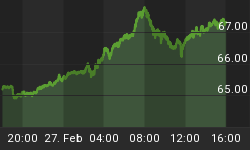We had a lethargic start to the week, which is not surprising: a long Memorial Day weekend that segues into a short week at the end of which the Employment data is released - that is a prescription for quiet trading.
True, over the weekend the President of Germany (Koehler) resigned, a fact which seems to have escaped most Americans; while ostensibly the trigger for his resignation was remarks made about Afghanistan, it is hard to imagine the growing Continental turmoil played no role. When times are good, one tries to ride out inconvenient political tempests. When times are not so good, well..."it may be time to write my memoirs!"
The ISM report was stronger-than-expected at 59.7, with decent internals. This plays distant second- or third-fiddle to the Employment report this week, but it helped stocks recover from a weak open, for a while at least. The Dallas Fed manufacturing index was weak, but ISM clearly trumps the regional figure.
Looking ahead to the Jobs number, by the way: while the data is likely to be quite strong because of Census hiring, note that HP announced 9,000 job cuts today and CitiFinancial declared it will close 376 branches, eliminating 720 jobs (those seem like pretty small 'branches', don't they?).
Stocks struggled heroically to start June, but by the close the trading pattern ended up looking much like those we saw in May. The S&P lost 1.7% and the VIX rose to 35%-ish on volume of 1.4bln, similar to that seen Friday. The September T-Note contract closed basically unchanged with the cash 10y yield at 3.29%.
- - Soapbox Mode: On - -
Recently, I was shopping for some long-term care insurance. One of the options I could elect was whether I wanted "inflation protection." Being an inflation guy, I was very curious about that option. It turns out that it is anything but "inflation protection," and in my opinion the providers of this insurance ought to be sued robustly at some point for false marketing. The policy in question (and there are many other sorts of policies, as well as certain "target date funds" and the like that use this approach) considered it to be "inflation protection" if the stated amount of the coverage rose at 3% per year.
How in the world is that inflation protection? If medical inflation is 0%, how much does your insurance coverage go up? The answer is: 3%. If medical inflation is 6%, how much does the coverage rise? 3%. How about if inflation is 100%? Same answer: 3%. There is absolutely no protection whatsoever. It is just a way of selling you more insurance on the installment plan. Precisely 3% more insurance per year, which of course you pay for.
Now, it would be pretty easy for a company to turn that into something resembling true inflation protection. A 30-year inflation swap costs 2.89%; this means that instead of providing systematically 3% more coverage you could provide inflation-protection ... at least, for headline inflation ... quite easily at at roughly the same price. (N.B. "easily" might not be entirely correct, because there are actuarial dynamics to the pool that implies a level-payment inflation swap isn't exactly correct, but the insurance company could offer a real product with a modicum of effort and risk, or jam a falsely-labeled product to an unsuspecting client who will be very disappointed if inflation goes to 10% and they discover they are not covered for inflation unless inflation happens to be exactly 3%. The latter approach is easier, which is why it is the default.)
It isn't like this is ridiculously difficult, and that there's no one out there who can show the insurance company how to do it. There aren't thousands of us, but there are plenty who understand enough about inflation markets that we could help design such a product. In my days on the sell side, I tried desperately to find clients who wanted to create an inflation-linked life annuity, for example, and this is a similar concept. But, alas, there appears to be no appetite for products that people consider "difficult to understand," even if they are vastly superior to the products on offer. This is a real tragedy, and not just for the people who sell such products. It is a tragedy for the people who would otherwise buy such products. 99% of them don't even realize that there's a better way, in the same way that most people didn't realize that the internet was a real boon to humankind because they had never heard of it...
It is from the sell side where these ideas can easily propagate, and such innovations would go at least a little way towards healing the image of Wall Streeters as money-grubbing jerks who don't care who they rip off. But the ideas don't propagate, perhaps partly because all of those money-grubbing jerks are too busy figuring out who is going to get ripped off next. Oh, I should distinguish between jerks...by the latter group I meant Congress. What Wall Streeter can focus on building long-term relationships right now when it's not clear what form the industry will be in, a year or two from now?
- - Soapbox Mode: Off - -
Pending Home Sales and Vehicle Sales are out tomorrow, but neither is a market-mover. The monthly ADP figures, normally released on Wednesday, have been pushed further into irrelevance by their postponement until Thursday. We will continue to focus on whether equities can continue to close above the flash-crash lows. I don't think they can.















